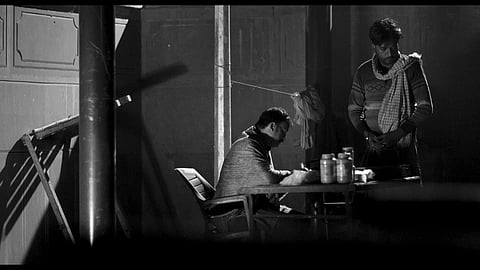Filmmaker Abhilash Sharma takes us through his film 'Swaha' that premiered at Kolkata International Film Festival
Filmmaker Abhilash Sharma’s latest film Swaha that premiered at the Kolkata International Film Festival is a black-and-white art in motion, told in the ancient Magahi language. We spoke with Abhilash about the riveting film.
What inspired you to make Swaha?
The seed for writing this film was planted after I watched the short anime film Animator vs. Animation by Alan Becker. However, as I delved deeper into the process, the characters and situations began to emerge from my understanding of the world and my personal struggles with it. Looking back, I realise that, at its core, the film is deeply connected to my relationship with my mother, an unconscious source of inspiration that shaped the story.
What’s the narrative of Swaha and how differently did you think of mounting it?
Originally, the story focused on creating two parallel worlds—a father in the city and a mother in the village—and how the child suffers despite their best efforts. As the narrative developed, Buddhist philosophy influenced its direction, bringing in themes of birth, life, and death. Rather than following a traditional approach, I focused on the essence of the story and its mood, letting everything come together naturally.
How did you choose the cast of the film?
Casting was one of the biggest challenges in making this film. Apart from Chandra Shekhar Dutta and Bulloo Kumar, most of the actors were newcomers. I also worked with talented actors from Patna’s theatre scene, and they surpassed my expectations with their performances.
How were you drawn to Buddhism and how has it changed you as a person?
I went through a personal tragedy that led me to explore Buddhism in search of peace. I realised that Buddhism begins with acceptance, and it gave me a new perspective to look beyond what is seen and heard. Every religion is rooted in faith, and we all need a way to use that faith to discover our own truth. For me, Buddhism’s view of life gave me the reason to explore and understand myself more deeply.
Do you plan to release the film on OTT or theatre?
Before OTT release, I want to ensure my film gets a theatrical release, even if it’s with limited screens. It’s important for me to show the film in theatres, especially to the people of Bihar, because the story is deeply connected to my bond with the land.
Tell us about your next film.
My next project is a Lucknow based drama set in a world where the idea of love and human connection is fading away, as we become increasingly disconnected from ourselves and consumed by the struggle for survival.

